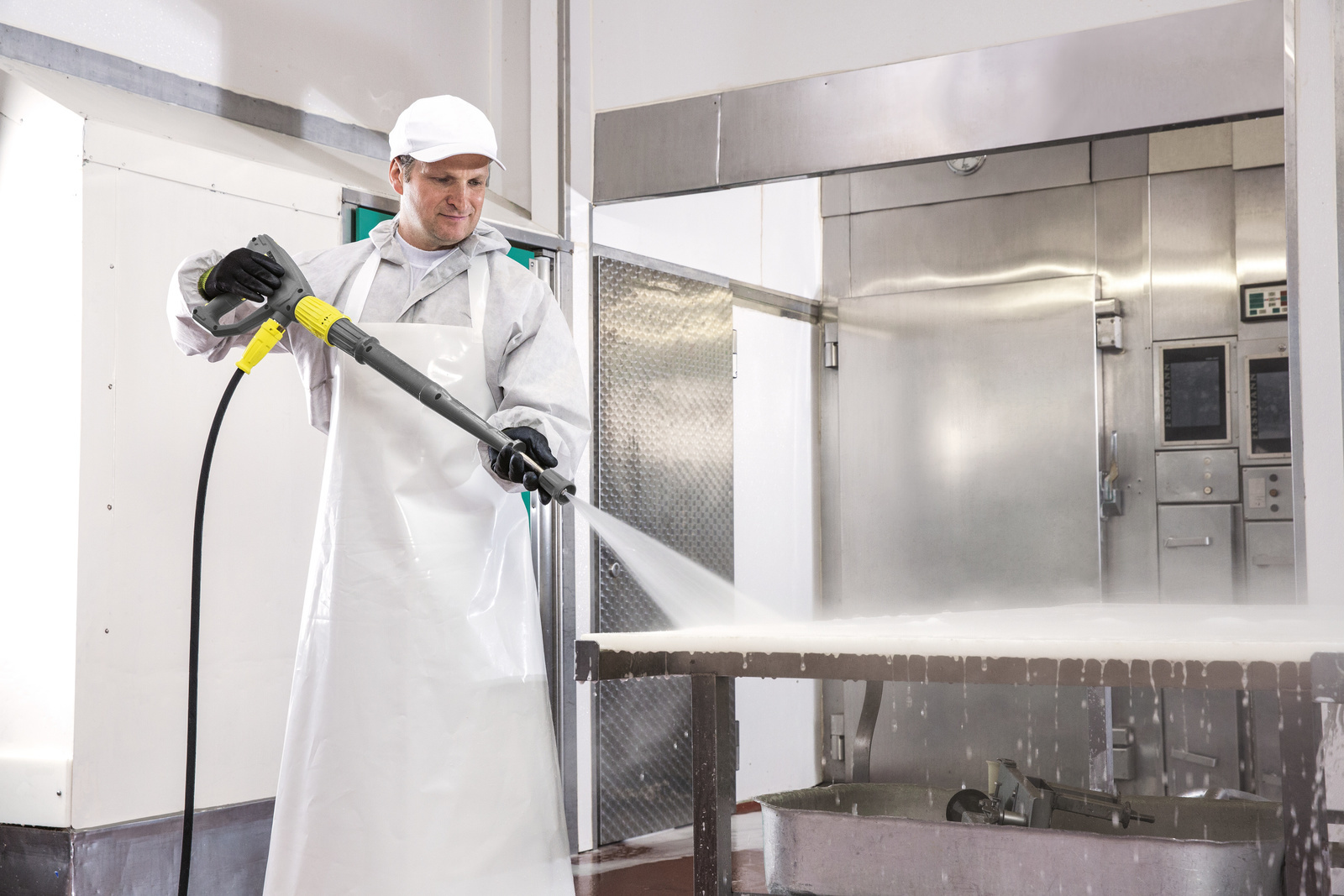Why High-Pressure Cleaning Is a Game-Changer for Factories

Factories are dynamic environments where machinery hums, production lines run, and workers are constantly in motion. Amid this activity, cleanliness often takes a backseat, yet it is one of the most critical aspects of ensuring operational efficiency and safety. Dirt, grime, grease, and other residues accumulate quickly in factory settings, creating not only an eyesore but also a potential hazard. Traditional cleaning methods, involving manual scrubbing or inefficient equipment, often fail to address these challenges effectively. In recent years, high-pressure cleaning has emerged as a revolutionary solution, offering speed, precision, and cost-effectiveness. Whether it’s maintaining machinery, cleaning factory floors, or adhering to strict industry hygiene standards, high-pressure cleaning has proven to be a game-changer.
High-pressure cleaning involves the use of a commercial pressure washer, a powerful machine that uses water at high velocity to remove tough stains, grease, and contaminants. When paired with the right pressure washer gun, this method ensures a thorough and efficient cleaning process. For factories in New Jersey and beyond, this technique has become a cornerstone of modern maintenance practices, delivering unparalleled results in maintaining cleanliness and operational standards.
The Importance of Cleanliness in Factories
Cleanliness in a factory is more than just about appearances. It directly impacts employee safety, product quality, and machinery performance. Greasy floors, for instance, increase the risk of slip-and-fall incidents, while dirty machinery can lead to breakdowns, reducing productivity and inflating maintenance costs. Furthermore, industries such as food processing, pharmaceuticals, and electronics manufacturing must adhere to stringent cleanliness regulations to avoid contamination and maintain compliance with government standards.
According to the Occupational Safety and Health Administration (OSHA), workplace cleanliness plays a vital role in minimizing accidents and ensuring a safe working environment. Studies indicate that clean factories report 40% fewer workplace injuries compared to those that neglect hygiene. High-pressure cleaning offers a targeted approach to address these issues, ensuring that no corner of the factory is left untouched.
How High-Pressure Cleaning Works
The working principle of high-pressure cleaning is relatively straightforward but highly effective. A commercial pressure washer generates water pressure at levels far beyond those of standard hoses, often exceeding 2,000 PSI (pounds per square inch). This high-pressure water stream is capable of breaking down stubborn residues, such as oil, grease, and industrial dirt, that traditional cleaning methods cannot remove.
The process typically begins with preparing the area to be cleaned. Factory operators identify the areas with the heaviest dirt accumulation and choose the appropriate nozzles and detergents for the task. The pressure washer gun, an integral part of the system, allows operators to direct the water stream with precision, ensuring thorough cleaning without damaging sensitive surfaces. After cleaning, the area is inspected to ensure all residues are removed, leaving the surface spotless and safe for use.
The Game-Changing Benefits of High-Pressure Cleaning
1. Time-Saving Efficiency
Factories operate on tight schedules, and downtime can lead to significant financial losses. Traditional cleaning methods, which require hours of labor, can disrupt production. High-pressure cleaning, however, completes the job in a fraction of the time. For instance, cleaning a heavily soiled factory floor manually might take an entire day, whereas a commercial pressure washer can accomplish the same task in a couple of hours. This efficiency not only saves time but also minimizes operational interruptions.
2. Cost-Effectiveness

While the initial investment in a high-pressure cleaning system may seem steep, the long-term savings are undeniable. Manual cleaning requires more labor, which translates into higher costs. Additionally, poorly maintained machinery due to inadequate cleaning can lead to frequent breakdowns and costly repairs. High-pressure cleaning ensures that machinery and surfaces remain in optimal condition, reducing maintenance expenses and prolonging the lifespan of factory equipment.
3. Improved Safety and Hygiene
Factories are often home to hazardous materials, including oils, chemicals, and dust particles. If not cleaned properly, these substances can pose significant safety risks. Slippery floors, for example, are a leading cause of workplace injuries. High-pressure cleaning effectively removes these hazards, creating a safer working environment. Furthermore, industries that produce consumable goods must maintain impeccable hygiene standards. High-pressure cleaning ensures that surfaces are free from contaminants, protecting both employees and end consumers.
4. Eco-Friendly Cleaning
In today’s eco-conscious world, industries are under pressure to adopt sustainable practices. High-pressure cleaning addresses this need by significantly reducing water usage compared to traditional cleaning methods. Many modern commercial pressure washers are designed to be compatible with biodegradable and eco-friendly cleaning agents, further minimizing their environmental impact. This makes high-pressure cleaning a responsible choice for industries striving to meet sustainability goals.
5. Compliance with Industry Standards
Regulatory bodies often impose strict cleanliness and safety standards on factories, especially in industries like food production, pharmaceuticals, and electronics. Non-compliance can lead to hefty fines and even factory shutdowns. High-pressure cleaning ensures that factories meet these standards consistently, giving operators peace of mind and protecting their businesses from legal and financial repercussions.
Choosing the Right Equipment for High-Pressure Cleaning
Selecting the right high-pressure cleaning equipment is crucial to achieving optimal results. A commercial pressure washer designed for industrial use is essential for handling the rigorous demands of factory cleaning. Key factors to consider when choosing equipment include:
- Pressure and Flow Rate: Industrial cleaning requires higher pressure levels and flow rates than residential models.
- Detergent Compatibility: Ensure the machine supports the use of industrial-grade cleaning agents.
- Durability: Look for equipment with robust construction, designed to withstand heavy use.
- Accessories: A versatile pressure washer gun, multiple nozzles, and durable hoses are essential for maximizing efficiency.
Case Study: Transforming a Factory in New Jersey
A manufacturing factory in New Jersey faced significant challenges in maintaining cleanliness due to heavy grease build-up on its machinery and floors. Despite employing a dedicated cleaning crew, the factory struggled to meet hygiene standards and often faced downtime for manual cleaning. After investing in a high-pressure cleaning system with a commercial pressure washer and advanced pressure washer guns, the factory witnessed remarkable improvements.
- Cleaning Time Reduced: The time spent on cleaning decreased by 50%, allowing the factory to focus more on production.
- Improved Compliance: The factory passed its next hygiene inspection with flying colors, avoiding potential fines.
- Worker Satisfaction Increased: Employees reported feeling safer and more comfortable in the cleaner environment.
This transformation highlights the tangible benefits of integrating high-pressure cleaning into factory maintenance routines.
Practical Tips for Effective High-Pressure Cleaning
- Train Your Team: Proper training ensures safe and efficient use of the equipment.
- Use the Right Detergents: Industrial cleaning often requires specialized solutions.
- Schedule Regular Cleaning: Consistency is key to maintaining cleanliness and safety.
- Inspect Equipment Regularly: Regular maintenance prevents breakdowns and ensures optimal performance.
- Prioritize Safety: Always use protective gear and follow safety protocols during cleaning.
Conclusion
High-pressure cleaning has redefined factory maintenance, offering unmatched efficiency, cost savings, and safety benefits. With tools like a commercial pressure washer and the right pressure washer gun, factories can maintain a clean and safe environment, boosting productivity and compliance. For industries in New Jersey and beyond, adopting high-pressure cleaning is more than a trend—it’s a necessity for modern operations.
By investing in this game-changing technology, factories can not only meet but exceed the demands of cleanliness, ensuring a brighter and more sustainable future for their operations.
FAQs
-
What makes high-pressure cleaning effective for factories?
High-pressure cleaning removes tough residues quickly and efficiently, making it ideal for industrial applications. -
Can a commercial pressure washer be used on delicate equipment?
Yes, many models come with adjustable pressure settings suitable for delicate surfaces. -
How often should factories schedule high-pressure cleaning?
It depends on the industry, but regular cleaning every 1-2 weeks is typically recommended. -
Are high-pressure cleaning systems eco-friendly?
Modern systems are designed to conserve water and are compatible with eco-friendly detergents. -
Where can I buy high-quality pressure washers in New Jersey?
Many reputable suppliers and online stores offer industrial-grade pressure washers tailored to factory needs.
What's Your Reaction?





















.jpg)
